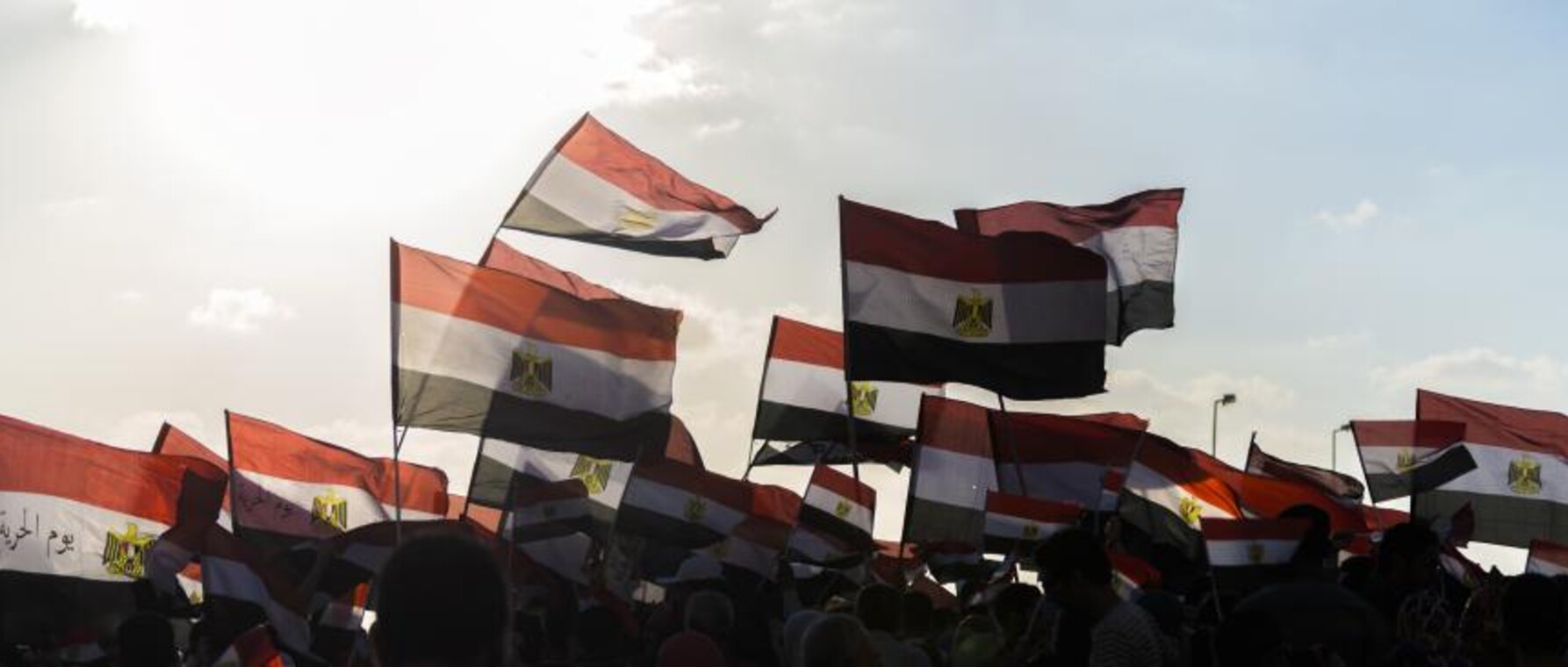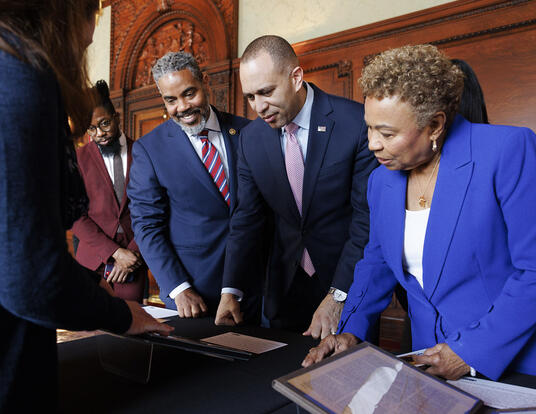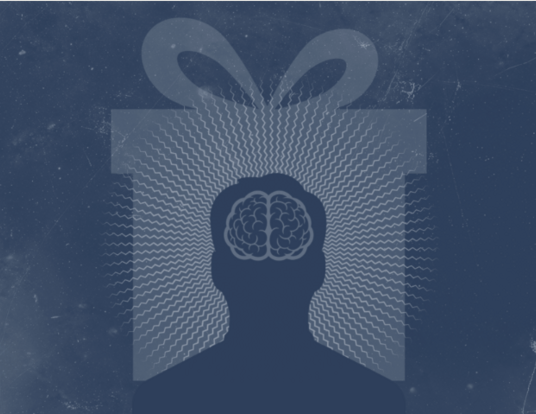Fake News in Modern Egypt
Bordewich studies information control and the politics of narrative in the Arab world

Research at Risk: Since World War II, universities have worked with the federal government to create an innovation ecosystem that has yielded life-changing progress. Now much of that work may be halted as funding is withdrawn. Find out more about the threats to medical, engineering, and scientific research, as well as how Harvard is fighting to preserve this work—and the University's core values.
Information wars—battles over maintaining narratives or pushing for what is “true” and what is “false”—are high-stakes power struggles between different parties—including nations. Today, political scientists and historians call the output of propaganda, leaks, and blatant misinformation a facet of the war between Ukraine and Russia, as both sides seek to have their own narratives accepted in their bid for victory. But information wars are not new and are certainly not tied to a place or time.
Chloe Bordewich, a 2022 PhD graduate in history and Middle East studies at the Harvard Griffin Graduate School of Arts and Sciences and the Center for Middle Eastern Studies, dove deep into the subject as it relates to modern Egypt. For her dissertation, “Leaking Empires: The Struggle over Information in the Eastern Mediterranean, 1870-1952,” she studied how the rise of mass media made it possible for the public in modern Egypt to access more information even as the government tried to use its power to conceal it.
“I deal with propaganda, disinformation, and fake news,” Bordewich says. “The thematic focus of my work is the history of public information and state secrecy. It’s a history of information and its use as a political battleground, and I’m particularly interested in the questions of what the public has the right to know and what the state is able to conceal.”
Secrecy Was the Default
Coolidge Professor of History Maya Jasanoff, who served as Bordewich’s dissertation advisor, says historians have “long understood that information control is an instrument of power.”

“Chloe is able to reveal with rare detail what was at stake as well as the intensity of the struggles waged over knowledge,” Jasanoff says. “It’s hard to understate the importance of shaping or controlling a shared narrative in the consolidation of modern nationalism.”
While the Egyptian military regime bolstered efforts to maintain support for the new government and cast doubt on the old, Bordewich says that her dissertation calls into question the dominance and efficacy of the state in these information wars.
“The state is made up of all kinds of actors, some of whom may be tasked with promoting a narrative in which they are not personally invested,” Bordewich says. “Factions within the apparatus of the state may seek to advance conflicting narratives. In short, historical narratives are rarely hegemonic.”
In her dissertation, Bordewich considered five episodes, stretching from the 1870s to the 1950s, to analyze how public access to information was contested.
“A lot of concealment has to do with the military and national security,” she says. “And it’s this definition of national security that becomes contentious because it can encompass subjects that go far beyond battle plans and troop movements.”
For most of world history—and in most places—secrecy was the default. “People couldn’t make a concerted demand for information from the state," Bordewich says. Her work sheds light on the way that access to information changed in modern Egypt—and what the consequences were when it did.
It’s hard to understate the importance of shaping or controlling a shared narrative in the consolidation of modern nationalism.
—Maya Jasanoff
Disruptive Technology
The first part of Bordewich’s dissertation looks at an understudied war between Egypt and Ethiopia in the late 19th century. Even though Ethiopia won the war, Egyptian officials did all they could to suppress knowledge of Egypt’s defeat on the home front. Their efforts to prevent the populace from knowing the details of Egypt’s loss, and even the fact that they had lost, were successful; however, five years later, a disruptive technology—the telegraph—would forever challenge the government’s ability to conceal information.
“Technology obviously plays a role in both determining what information is circulated and what information can be prevented from circulating,” Bordewich says. “Telegraphy was prone to leakage because of the reliance on telegraph operators—a third party—to transmit or convey information.”
The roughly contemporaneous and related emergence of mass media in Egypt in the later 19th century also changed the landscape, as newspapers could both conceal and disseminate information—whether true or false.
“Some newspapers saw themselves as advocates for information release, while others served as disseminators of false information,” Bordewich says. “Leakers also worked in tandem with the press.”
As mass media picked up steam, Egypt became “very competitive, with newspapers funded by the French, the British, the Ottomans, and so on,” Bordewich says. This was in addition to the Egyptian Official Gazette, which provided a government-approved take on events.
Maintaining certain narratives and concealing conflicting details through the control of information or dissemination of disinformation can be a way of maintaining the stability of institutions. But, as Bordewich shows, it can also lead to their overthrow. Her research follows political battles over information through the mid-20th century—for instance, during the 1948 war in Palestine between the Arab states and Israel.
Technology obviously plays a role in both determining what information is circulated and what information can be prevented from circulating. Telegraphy was prone to leakage because of the reliance on telegraph operators—a third party—to transmit or convey information.
—Chloe Bordewich
“Popular anger at the absence of information that convincingly explained the loss of the war contributed to the ouster of the Egyptian monarchy in 1952,” she says. As a result, “an aura of moral purity surrounded the Egyptian Free Officers, who took control and established a military regime whose inheritors still hold power today. Following the 1952 coup, a wave of popular culture production emphasized this moral dichotomy between the Free Officers and the old monarchy.”
Perhaps not surprisingly, given her topic, Bordewich was denied access to materials in Egyptian state archives that would advance her research on public access to information, despite applying multiple times. Fortunately, as a PhD candidate at a well-funded university like Harvard, Bordewich was able to conduct her research in multiple countries, which Egyptian graduate students studying locally may not be able to do.
“People who are researching their own history, their own society, do not have access to those archival resources because of surveillance, because of censorship, because of concealment of archives, and it’s something we should think about,” she says. “It’s a problem not just because access is usually a good thing, but also because the gap in resources combined with restricted access perpetuates inequalities in the production of knowledge.”
For researchers like Bordewich, the risks of revealing state efforts to conceal or manufacture information go well beyond loss of archival access. Jasanoff says her advisee might have been surveilled—or worse.
“The politics of information control are alive and violent in Egypt today,” she says, “which makes this look at how they operated in Egypt in the past that much more important.”
Banner Courtesy of Shutterstock
Get the Latest Updates
Join Our Newsletter
Subscribe to Colloquy Podcast
Simplecast





